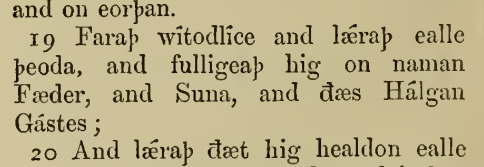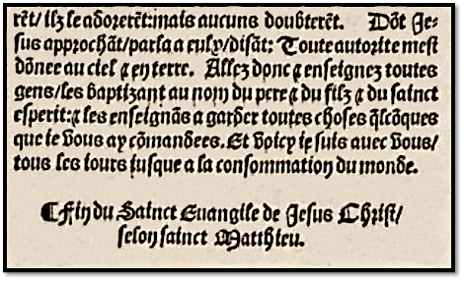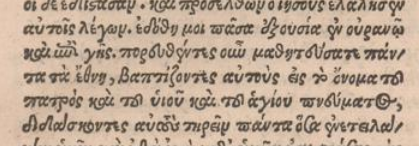Matthew 28:19
Authenticity traced through time from the early Christian church to modern history.
The "Itala" Bible, the first Latin translation of the Greek New Testament, was translated from the original Greek text in the Christian capital of Antioch around 120 AD. It has been confirmed that the "Itala" (also known as "Old Latin") was well-known and in use among Latin-speaking Christians no later than 157 AD. Tertullian, quoting from the Old Latin Itala text, wrote:
“Go,” He saith, “teach the nations, baptizing them into the name of the Father, and of the Son,
and of the Holy Spirit.”
Ante-Nicene Fathers Vol. 3 book 1 The Writings of Tertullian Chap. 13
Irenaeus (a disciple of Polycarp and the first missionary to the Waldensian area of Northern Italy) wrote around the year 182 AD:
“He said to them,” Go and teach all nations, baptizing them in the name of the Father, and of the Son, and of the Holy Ghost.” (Mat_28:19)”
Ante-Nicene Fathers Vol. 1 section 8 book 3 Chap. 17
Lucian of Antioch (the Christian bishop that, finishing the work that Polycarp started, gathered up all the writings of the Apostles and compiled the complete NT) wrote in 300 AD:
“We believe… in the Holy Ghost given for consolation and sanctification and perfection to those who believe; as also our Lord Jesus Christ commanded his disciples, saying, 'Go ye, teach all nations, baptizing them in the name of the Father, and of the Son, and of the Holy Ghost;’ clearly of the Father who is really a Father, and of a Son who is really a Son, and of the Holy Ghost who is really a Holy Ghost ; these names being assigned not vaguely nor idly, but indicating accurately the special personality, order, and glory of those named, so that in Personality they are three, but in harmony one.”
Creeds of Christendom 1896 Vol.2 p.26
The original old Anglo-Saxon Bible, translated in 995 AD,
translates Matthew 28:19 like this:
"FaraÞ witodlice and lǽraÞ ealle Þeoda, and fulligeaÞ hig on naman Fæder, and Suna, and dæs Hálgan Gástes;"

Martin Luther's 1522 AD German New Testament translates Matthew 28:19 as:
"darumB geet hyn / vnd leren alle vόlcter / vnd teusst sy in den namen des vatters vnd des suns
vnd des heyligen geysts /"
The English Bible translated in 1526 AD by William Tyndale reads:
"Goo therefore and teache all nacions, baptisynge them in the name of the Father, and the Sonne,
and the Holy Goost"
Miles Coverdale's 1535 AD English Bible translation reads:
"Go ye youre waye therefore, and teach all nacions, and baptyse them in the name of the father, and of the Sonne, and of the holy goost"

The Olivetan Bible, translated by Calvin's cousin, Pierre Robert Olivetan, in 1535 AD,
was the French Bible that the Waldensian church gave as a gift to the Protestant Reformation, to show their support of Protestantism. The Waldensian church not only commissioned it to be translated, but they also raised 1500 gold crowns to pay for it to be published.
It reads:
"Allez donc & enseignez toutes jens / les baptizant au nom du pere & du filz & du sainct esperit:"
When Erasmus, in 1535 AD, restored to the Christian world the Greek New Testament text of Lucian of Antioch, this verse specifically read:
"Πορευθέντες οὖν μαθητεύσατε πάντα τὰ ἔθνη, βαπτίζοντες αὐτοὺς εἰς τὸ ὄνομα τοῦ πατρὸς καὶ τοῦ υἱοῦ καὶ τοῦ ἁγίου ωvoὺματσ

In 1556 AD, Theodore Beza's Greek New Testament text read:
"Πορευθέντες οὖν μαθητεύσατε πάντα τὰ ἔθνη, βαπτίζοντες αὐτοὺς εἰς τὸ ὄνομα τοῦ πατρὸς καὶ τοῦ υἱοῦ καὶ τοῦ ἁγίου πνεύματος"
The original 1560 Geneva Bible, translated in Geneva by many exiled Protestants including John Knox, reads:
"Go therefore, & teache all nacions, baptizing them in the Name of the Father, and the Sonne,
and the holie Gost"
The original 1611 Authorized King James Bible (KJV) translated this verse as:
"Goe ye therefore, and teach all nations, baptizing them in the Name of the Father, and of the Sonne, and of the holy Ghost:"
The Greek New Testament text translated by the Elzevir brothers in 1633 (and where we find the origin of the name "Received Text" which was then retrofitted back to refer also to the texts of Beza, Erasmus, and Lucian of Antioch) was translated as:
"πορευθεντες ουν μαθητευσατε παντα τα εθνη βαπτιζοντες αυτους εις το ονομα του πατρος και του υιου και του αγιου πνευματος"
The 1769 KJV Bible (which was the culmination of the spelling and orthography corrections of the original 1611 KJV, and the edition of the KJV that all non-copyright KJV Bibles today are based on), reads as:
"Go ye therefore, and teach all nations, baptizing them in the name of the Father, and of the Son,
and of the Holy Ghost:"